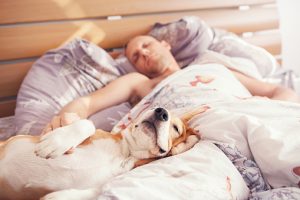
If you find yourself tossing and turning and not achieving at least eight hours a night of sleep, a new study may have an easy solution for you. The Mayo clinic has recently found that sleeping with a pet may offer benefits when it comes to sleep.
The Centers for Disease Control and Prevention (CDC) report that insufficient sleep is a public problem which can have serious health implications including an increase in accidents and chronic diseases. The CDC reports that those who do not achieve sufficient sleep are at higher risk for hypertension, diabetes, depression, obesity, cancer and increased mortality.
Common causes for sleeplessness include:
- A glass of wine after dinner – Alcohol does make you feel sleepy initially. But after a while it can have a stimulating effect, waking you up throughout the night and making deep sleep impossible.
- Your bedroom ambience (part 1) – Electronic devices, including laptops, cell phones, and TVs, all give off light that can mess with your body’s production of melatonin, the hormone that helps you fall asleep at night.
- Your bedroom ambience (part 2) – The temperature in your bedroom is crucial. The temperature in your bedroom is crucial. When you are in a room that’s too hot or too cold, you may not sleep well. Studies show that room temperatures below 65 and above 75 have a negative effect on sleep cycles. So try to keep it in that range.
- Your bedtime snack – Foods that are high in refined carbohydrates (chips or pretzels) can cause a quick rise in your blood sugar which in turn leads to a surge of insulin that can bring down your body’s blood sugar levels. Once this happens your body responds by releasing stress hormones such as cortisol and adrenaline. This hormonal disturbance can make it very hard to fall and stay asleep.
- Sleeping in – Most people think they can “catch up” on sleep lost during the week. But when you get up late on weekends, it can actually be worse for you. Your body has a natural wake/sleep cycle, also known as its circadian rhythm. When you stay up too late or sleep in too long, you upset that rhythm and make it tougher to get back on track.
- Your mattress – A bad mattress and a pillow that doesn’t support your body right spell bad news for sleep.
While addressing the above reasons will definitely help, there is something else that you can do to help you sleep better.
Sleeping with a pet may improve sleep
The researchers sampled 150 sleep center patients where 56 percent of them allowed their pet to sleep with them in the same bed. Of those who slept with their pet, 41 percent reported that their pet did not disrupt their sleep and in fact their sleep improved as the pet offered warmth, contentment, or relaxation. Only 20 percent reported that their pet disrupted their sleep.
Some pet owners reported their pet made them feel a sense of companionship, especially when sleeping alone either due to lack of partner or a traveling partner.
In addition to the above mentioned causes of sleeplessness there are other more severe reasons like chronic body aches, illnesses, and mental and physical stress that lead to sleeplessness. In these cases, it is important to address the underlying problem first. Contacting your doctor will be a step in the right direction.